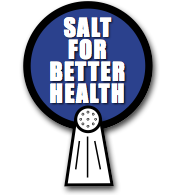Frank is always sending me emails about the benefits of salt. So I created this space so you can look over my shoulder and gain the benefit of his thoughts, notes and sources:
Hydration
My underlying assumption is that practically ALL illness is caused by malnutrition. We know that some people living in more or less the same environment as we do and with access to the same food will suffer from malnutrition while some do not. Malnutrition, therefore, is not caused by what we fail to eat, but what we FAIL TO DIGEST. This is also the basis of Hyppocrates... "Let food be our medicine and medicine be our food".
To digest our food properly, humans add hydrochloric acid to our digestive juices. A healthy human is capable of producing 3 litres of digestive fluids with a pH of 1 every day. This is 6 and 1/3 pints of EXTREMELY CORROSIVE fluid which would easily destroy the skin of any hand placed into it in a very short time.
You will enjoy this video....
Hydrochloric acid is created when the parietal cells in the Fundus of the stomach convert sodium chloride (table salt) into hydrochloric acid. http://en.wikipedia.org/wiki/Parietal_cell (by the way... this wiki article completely avoids mentioning that the source of the chloride is salt).
The hydrochloric acid LIBERATES the other minerals that we need from the food we eat. However, SODIUM CHLORIDE is NOT present in any natural food. Moreover, SODIUM CHLORIDE is being reduced in processed foods. As we age, the efficiency and number of parietal cells declines.
Assuming 100 % efficiency, it takes 17 grams of salt to produce 3 litres of gastric fluid with a pH of 1. I understand that most people today have gastric fluid with a pH of 3 or 4.
Gastric fluid with a pH of 1 is TEN THOUSAND TIMES the strength of fluid with a pH of 4.
Diseases
Epilepsy
hmmm... it seems that salt really is Lilly the Pinks Medicinal Compound... most efficacious in every way.
http://www.epilepsy.com/node/992321
Discussions about salt
Low sodium seizures
I just found this thread... it is a mind blowing read. The people are just tied up in knots about salt intake... and yet...
http://www.healingwell.com/community/default.aspx?f=23&m=1855582
A Comparison of Veterinary Science and Medical Science
In veterinary science, the part salt plays in animal nutrition is well understood. A typical example being Salt Institute on Digestion and Absorption, quoted verbatim below :–
Sodium and chloride are essential for numerous processes in the body including the regulation of osmotic pressure and acid-base balance. Both sodium and chloride also play important roles in the digestion and absorption of several nutrients from the gastrointestinal tract. Absorption of glucose and most amino acids from the small intestine requires an adequate supply of sodium. In cattle, magnesium absorption from the rumen is dependent on sodium. Chloride is necessary for the production of hydrochloric acid in the stomach of simple stomach animals and the abomasum of ruminants. Hydrochloric acid is required for the digestion and absorption of many nutrients. Most feeds are deficient in sodium. Salt is the cheapest and most common source of sodium and chloride in animal diets. A low intake of salt can reduce nutrient absorption resulting in reduced growth and efficiency in animals.
I have just been watching video after video after video discussing the importance of strong stomach acid...
NOT A SINGLE ONE OF THEM MENTIONS THAT SALT IS REQUIRED TO PRODUCE HYDROCHLORIC...
Just for curiousity, I have looked at dozens of video on stomach acid now... and only one mentions the use of half a teaspoon of salt just to make the ginger or whatever more palatable.
Types of salt
Rose Salt
Just an observation on this product http://www.therosesalt.com/rosesalt.htm...
The analysis is impossible to be correct. A milligram is one thousand of a gram. This means that the components simply do not add up to 100 grams.
What I think it is supposed to say is that the Sodium is 38.6%... this means that it is practically the same as any other salt, which is normally 40% Sodium.
Iron in salt is rubbish.. and probably inimical to human health in this form.
Sea salt typically has higher proportions of magnesium, calcium and potassium than this product.
Further investigation required but, at this stage, this product is a fail.
